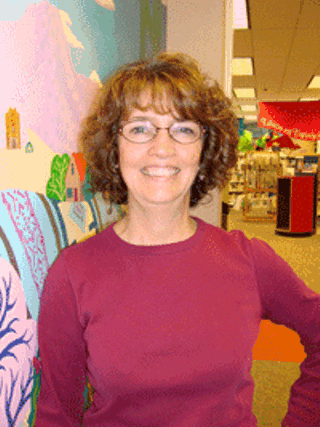The library has changed since we were kids. Can you make a little noise here if you wanted?
Yes, you can, because I think we've really gotten away from that old stereotype. I think libraries realized they had to be more accepting, and it isn't static. You have to change as the community changes, and things right now are less formal. ... I think we also wanted to be more welcoming. There was this attitude of, "Be quiet and don't touch," you know. It's that "shush" thing that I think has really changed. We are now more of a community place that people can be more comfortable in.
People go out of their way to come to the downtown children's library. Why is that?
I consider ourselves to be a destination point. We often get school visits. We had a (group) that came all the way from Vail Elementary and others from different cities. We give them a tour. And, of course, parents from all over like to come and just visit in the room, just to spend time with their children.
What do you see as your mission as a children's librarian?
I think my mission is to be an advocate for youth, and really for parents, too. We try to find the right information to help them with lifelong learning. We provide story times to help model for parents the importance of reading to young children and to really engage kids so they think reading is a fun activity. We want to get them on that road, and hopefully it will be an activity they enjoy for the rest of their lives. Obviously, a literate community leads to really intelligent people growing up and taking over as adults in our cities.
The library fosters community partnerships. What partnerships do you have in Tucson?
In our youth-services department, we have developed a partnership with (the nonprofit) Child and Family Resources. I teach one of the classes for Ready to Read, an early-literacy project. We work with Child and Family Resources to get in contact with early-childhood educators, like preschools and any early home-care providers. We invite them to a six-hour workshop which is certified through the state, and they receive credit for attending. We talk about early brain development and the skills children receive from being read to at an early age. Research is telling us that from (the age) 0 to 5 is so crucial for the development of the brain.
How did you become a librarian?
I'm kind of a late bloomer. I actually was a cashier for several years and a college dropout. ... I was working on being a mother, and I was out of the education field for 20 years, and then I went back to school and got my master's in library science. I've only been in the field for about six years. I really wasn't certain where I would work, but I just kind of fell into the children's area, and I really do love it.
What would surprise most people about your work?
We work with parents more than people realize. Parents are looking for help and will ask us. We've had parents tell us their child isn't reading at the right level and (ask) what they should do. People are looking for parenting classes and good child care. They have questions, so we end up working with the whole family.
What keeps people from coming to the library?
People are always so grateful and always thank us for everything we do, but maybe not all segments of the community know or realize this is available (and that) it is totally free. They may also not know it's not just about books. One of our big pushes is really doing outreach. We know there are people who don't come into the library, so, hey, we bring the library to them. We've learned that libraries don't have to be in a building to make a difference. We've made a big push to go into schools and work with other organizations to make our presence known and keep on our mission.





